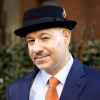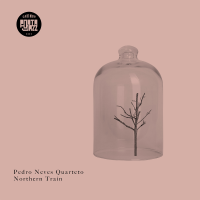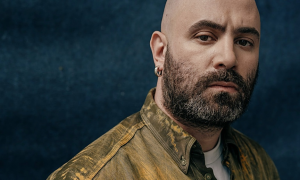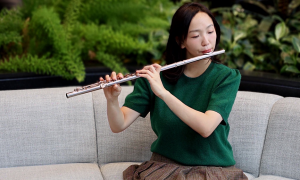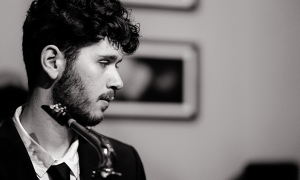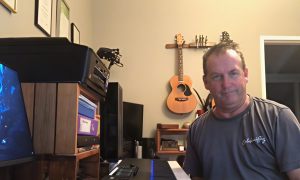Home » Jazz Articles » Take Five With... » Take Five With Brian Charette
Take Five With Brian Charette
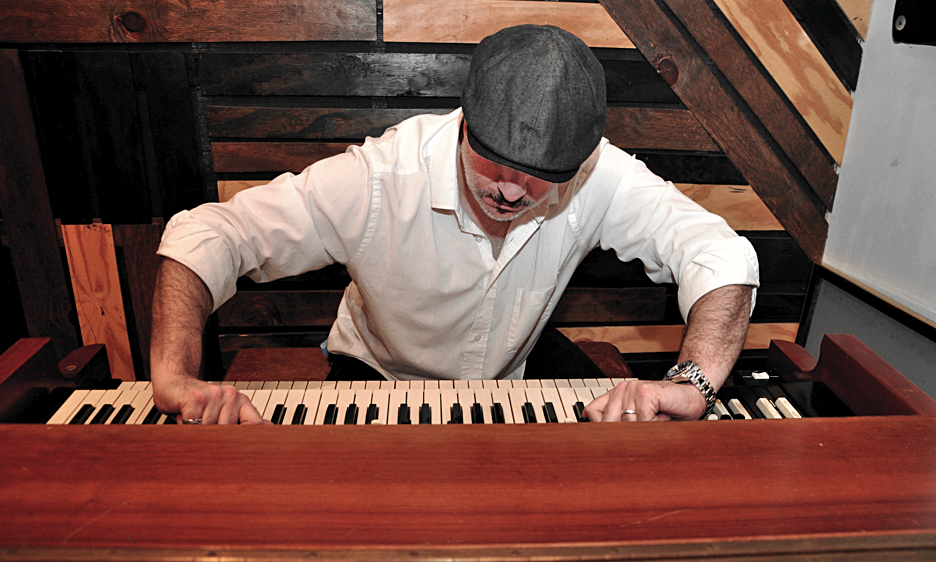
Meet Brian Charette:
Grammy-nominated organist/pianist, Brian Charette, has established himself as a leading voice in modern jazz. Besides being a critically acclaimed composer and bandleader, he has worked with many notable artists such as Joni Mitchell, Chaka Khan, Lou Donaldson and countless others.Charette is a Hammond endorsed, SteepleChase and Posi-Tone recording artist. In 2019, Charette released Beyond Borderline (Steeplechase), his sixth as a leader and was rated with 3 ½ stars in Downbeat. His recordings have been dubbed as "Reliably burning" by Jazz Times and he has been called a "Master of space and time" by WGBO. In the December 2020, Charette will release Like the Sun and a new sextet recording from SteepleChase March 15, 2020 Power from the Air .
This year, before Covid, Charette has been playing very successful engagements in NYC, Los Angeles, Detroit, Cleveland, New Orleans, Spain, Switzerland, Indonesia, Czech Republic and Germany. He also just placed 6th in the 2020 Downbeat Critic's Poll for Organ." Charette also won "Rising Star" from Downbeat in 2014 and "Best Organist in NYC" from Hot House Magazine in 2015
Mr. Charette is an active educator. In addition to writing for Keyboard Magazine, Downbeat, and Muzikus, he teaches master classes all over the world, and is on the faculty of the Czech Summer Jazz Workshop at Jezek Conservatory in Prague. He also has a new Hammond Organ instructional video on mymusicmasterclass.com and is featured prominently on two new Mel Bay instructional DVDs by Rodney Jones and Sheryl Bailey.
Outside of music, Brian is passionate about chess and White Crane kung fu, in which he holds a black sash.
Instruments:
Piano and organ.Teachers and/or influences?
Kenny Werner and Charlie Banacos.I knew I wanted to be a musician when...
I was three and would wander down to the piano, open a book called Folk Songs to a two page song called, "The Great Wall." I would stare at the animated picture of the Great Wall of China with people walking, merchants selling, and a horse drawn ambulance while improvising for hours.Your sound and approach to music:
I play jazz but I would have to say I'm more of a rocker in my approach. I can be very angular and aggressive in the way I play. I try to balance this with extensive use of space and compositional devices. The solos in my groups are often very short and the motives of the pieces can be very minimal and trance inducing. Lately, I've been incorporating a lot of synthesizers, samplers, and drum machines. I've gone totally in this direction for the new album, Like the Sun.Your teaching approach:
I try to show students how to spend time practicing only things they are weak in. After they identify the problem, I tell them to only focus their practice on one weak area at a time until they really internalize the concept they are working on. For example, I had one student practice only in the key of Ab minor for a month. At the end of the month, the student always sounded amazing when we got to an Ab chord change and before had always stumbled over the chord.Your dream band:
I already have two dream bands with the trio and sextet. I do have a fantasy of playing piano duos with Chick Corea. I would also very much like to play with Roy Haynes.Road story: Your best or worst experience:
One time, 20 years ago, I was playing in Brussels. The King of Belgium had just died a few days before. We were playing in a very big festival with about 8,000 people. There were huge video screens on the side of the stage. The singer picked up a picture of the king that had just died from a cigarette machine backstage and held it up to the audience. There was a camera on him and all the people started to cheer. The road manager on the side of the stage started to wave his arms furiously to put the picture down. The singer gave the road manager the bird and told him to relax. Unfortunately, one of the cameras was on him, and all 8,000 Belgians saw was a big middle finger in front of the picture of their beloved king. They threw rocks and beer at us for an hour. We made the news and left very quickly the morning after the show never to return.Favorite venue:
My favorite place to play is Small's in NYC. It has the best vibe of any jazz place I have ever been. I also feel so supported by Spike Wilner and the whole gang at Smalls.Your favorite recording in your discography and why?
I would have to say my favorite recording is this new one. I did everything on the album myself; every part, mix, entrance, song order, and mix was carefully scutinized. Most of my albums are completed very quickly, but this one took two years to make. I spent a lot of time getting everything just the way I liked it. The album cuts are also recorded live except for two guitar overdubs. Most of the time was spent rehearsing the performances and the difficult dance of manipulating the machines and sequencers at just the right time.The first Jazz album I bought was:
Jimmy Smith, Unfinished Business (Mercury, 1978).What do you think is the most important thing you are contributing musically?
I'm really trying to push the boundaries of organ music. I'm always reaching for sounds I've never heard before. I'm so interested in electronic music and am so interested in combining these robotic sounds with the earthy tone of Hammond organ.Did you know...
I hold a black sash in White Crane Kung Fu. I was also deaf until the age of nine.CDs you are listening to now:
Kraftwerk: Computer World (Warner Bros., 1981);Jimmy Smith: House Party (Blue Note, 1958);
Bela Bartok: Bartok: 6 String Quartets (Deutsche Grammophon, 2006);
Hiatus Kaiyote: Choose Your Weapon (Flying Buddha, 2015).
Desert Island picks:
The Beatles, White Album (Apple, 1968);Deep Purple, Machine Head (Warner Brothers, 1972);
Hank Mobley, Soul Station (Blue Note, 1960);
Kiss, Alive II (Cassablanca, 1977);
Emerson String Quartet, Debussy-Ravel String Quartets (Deutsche Grammophon, 1995).
How would you describe the state of jazz today?
I think jazz is in a great place even though the world is going through very difficult times. There are tons of great artists, especially in NYC. I feel very inspired by my peers and I love to listen to their music and get new ideas about my own writing and playing. I am friends with Sam Yahel, Jared Gold, Pat Bianchi and all of the NYC organists. I love to listen to their albums and live gigs. Because their level of artistry is so high, it pushes me to get better also.What are some of the essential requirements to keep jazz alive and growing?
I think we have to make music that communicates to real people, not just musicians. That's not to say that it can't be complicated. I think people are actually pretty smart. I feel like some jazz music is a little selfish though, and the cats can be a little dark. This turns people off to the music. I think if we, as artists, thought more about communicating to our audience, many more people would be interested in jazz albums and concerts.What is in the near future?
I have a CD release at Soapbox Gallery in Brooklyn on Deccember 5 so I'm spending a lot of time preparing for that. I will perform the whole album live. I also have a new SteepleChase recording with Music for Organ Sextette coming out March 21 and we will have the release at Dizzy's at JALC on April 21, 2021 if clubs are open by then. I'm working on music for larger ensembles also; I'm writing brass music for The Modern Art Orchestra to be performed in October 2021, and string quartets.What's your greatest fear when you perform?
My greatest fear is that my instrument won't work, or that it will play a minor third higher like it did in Thailand when the power to the B3 was incorrect.What song would you like played at your funeral?
"Nowhere Man" by The Beatles.What is your favorite song to whistle or sing in the shower?
"You'll Never Find" by Lou Rawls. I'm always singing it.By Day:
Lately I've been teaching a lot of private lessons over Zoom. It's really been helping since I have so few concerts lately.If I weren't a jazz musician, I would be a:
A gardener or martial arts instructor.Tags
Brian Charette
Take Five With...
United States
Joni Mitchell
Chaka Khan
Lou Donaldson
Rodney Jones
Sheryl Bailey
Kenny Werner
Chick Corea
Roy Haynes
Spike Wilner
Yotam Silberstein
Mark Ferber
Jimmy Smith
Matt Mitchell
Tigran Hamasyan
Grant Green
Kenny Dorham
Vijay Iyer
Hank Mobley
Sam Yahel
Jared Gold
Pat Bianchi
PREVIOUS / NEXT
Brian Charette Concerts
Support All About Jazz
 All About Jazz has been a pillar of jazz since 1995, championing it as an art form and, more importantly, supporting the musicians who make it. Our enduring commitment has made "AAJ" one of the most culturally important websites of its kind, read by hundreds of thousands of fans, musicians and industry figures every month.
All About Jazz has been a pillar of jazz since 1995, championing it as an art form and, more importantly, supporting the musicians who make it. Our enduring commitment has made "AAJ" one of the most culturally important websites of its kind, read by hundreds of thousands of fans, musicians and industry figures every month.


